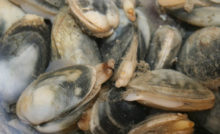novovirus


Norovirus are a virus group that cause gastroenteritis, a disease generally accompanied by diarrhea and/or vomiting. Norovirus, which are spread to the four corners of North America, are very infectious.
The name "Norovirus" comes from the fact that a norovirus has been identified for the first time as a virus in 1972 Following a hatching in Norwalk, in Ohio.
What causes a norovirus infection ? How is the infection?
Norovirus are present in the stools or vomiting of infected people. As they are very contagious, They can easily spread from person to person. People can become infected with virus in several ways, including :
- by direct contact with another infected person (p. ex. By taking care or changing the diapers of a sick child, by sharing food or utensils with a sick person);
- by touching surfaces or objects contaminated by a norovirus (like doors);
- by consuming contaminated food or drinking water.
People who have been exposed to the virus usually have symptoms in 24 to 48 following hours, But symptoms can only appear 12 hours later. People infected with a norovirus can be contagious from the moment they start to feel sick up to at least three days after recovering. Some people may be contagious even two weeks after their healing.
Most hatching of food diseases caused by noroviruses probably arise when food is contaminated by infected people who handle them, Especially if they do not wash hands well after using the toilet. Certain foods can be contaminated at source (p. ex. Molluscs and crustaceans, as oysters, may have been contaminated by the presence of wastewater before their harvest). Hydrical hatching are often caused by contamination by wastewater and water used for recreational purposes by well.
What are the symptoms of diseases caused by norovirus?
Main symptoms of diseases caused by a norovirus :
- nausea;
- vomiting;
- diarrhea;
- stomach cramps.
Other symptoms :
- low fever;
- frisson;
- headache;
- muscle pain;
- fatigue.
The disease often appears suddenly, from 24 to 48 hours after the exhibition, And the infected person can become very sick when he is struggling with frequent vomiting and/or diarrhea. As a general rule, Children have more vomiting than adults.
What is the duration of the symptoms ?
In the most healthy people, acute diarrhea and vomiting usually last from 24 to 72 hours, and they will normally restore in 24 to 48 hours. In a number of people, Symptoms can be prolonged.
Most people feel better after a day or two; Symptoms are absorbed and disease does not lead to long -term health repercussions.
How long do people affected are contagious ?
People infected with noroviruses are contagious from the moment they begin to feel sick up to at least three days after their recovery. Some people can be contagious a good two weeks after recovering. Good hygiene practices, like frequent washing of hands, are very important during this period.
Some foods increase the risk of being infected with a norovirus ?
Long infections by a norovirus have been associated with molluscs and crustaceans, like oysters harvested in contaminated waters.
The virus is also transmitted by the consumption of contaminated drinking water or not treated.
Are some people more at risk of being more seriously affected by a disease caused by a norovirus?
Infection can lead to diarrhea and severe vomiting, likely to cause dehydration, primarily in very young children, the elderly and people with weakened immune systems.
Are noroviruses dangerous? The danger is it greater for some people?
As a general rule, Noroviruses cause symptoms unpleasant gastrointestinal, such as diarrhea and vomiting. A more serious illness, including dehydration, is more likely to occur among toddlers, the elderly and people whose immune system is weakened.
Deaths occurred in establishments of long-term care during norovirus outbreaks, But it is difficult to assert to what extent these viruses caused death in people who were already fragile or sick. It would be a contributory factor in death, and not the cause of death.
Diseases are caused by noroviruses throughout the year, But they are more common during winter and they affect all age groups. A disease caused by noroviruses can resurface throughout a person's life.
Read more : Canada Public Health Agency
Recent Posts
Cakes, Candy : Warning on nanoparticles
100 % tested products contained nanoparticles ! [...] Les résultats de cette expérience ont…
How to eliminate toxins ?
After a series of festive meals, caloric menus, alcoholic or carbonated drinks,…
Plastic, not so fantastic!
Plastic pollutes the environment, we all know it. Il faut aussi rappeler que les objets…
How to eat healthy during lunch break ?
At work, lunch breaks are often done on the go, en quelques minutes et…
Eat healthy, it's really possible ?
These last years, le bio et le sain se sont imposés avec insistance dans nos…
Sausages and merguez salmonella
The company L’Atelier du Valois has recalled batches of "Plateau variegated" suite…

